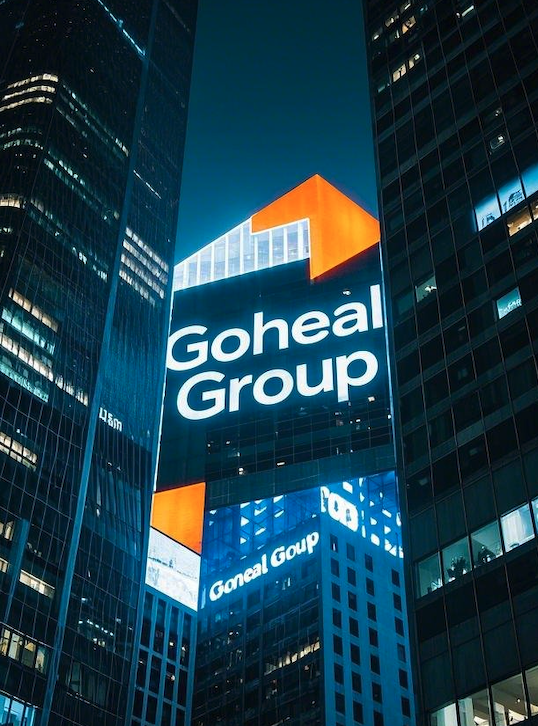"Putting the cart before the horse, losing in the east, gaining in the west." This is a wise saying that the ancients warned us, reminding people that in the process of pursuing wealth, they must clearly understand the nature of behavior and the ultimate destination of the goal. Capital operation is like the opposite of this warning. If you don't understand the core principles, you may often get half the result with twice the effort, or even fall into the misunderstanding of blindly pursuing interests, which will eventually lead to "losing in the east" and not being able to gain the real "west".

American Goheal M&A Group
In recent years, many "classic stories" have emerged in the capital market. Some of them became famous overnight with high-risk operations of "making money out of nothing", and some of them suffered huge losses due to improper operations and eventually withdrew from the market. As investors and entrepreneurs, how to avoid these misunderstandings and truly realize the "making money" of capital instead of going into the abyss of losses is a difficult problem that needs to be solved urgently.
Here, we start with several classic cases, combined with Goheal's many years of practical experience, analyze the common misunderstandings in capital operation, and provide practical and feasible breakthrough paths to help entrepreneurs and investors move from "paper wealth" to real wealth growth.
1. Analysis of classic cases: the "two-sidedness" of capital operation
Capital operation is often full of temptations, but it also has two sides. Some operations seem to be shining opportunities, but in fact they are full of huge risks, while some successful cases provide us with valuable lessons.
The leverage trap of reverse takeover
A cultural businessman successfully integrated the advertising resources of the TV station and the program producers by registering an offshore company (Company X), and successfully listed on the Hong Kong stock market through a "reverse takeover". This process is called "empty-handed white wolf" by many people. In just two years, the businessman repaid his debts through leveraged financing and eventually became a billionaire.
On the surface, this case is undoubtedly a classic of capital operation. The businessman accurately identified the resource mismatch in the market - the TV station lacked content, the program producers lacked funds, and the listed company lacked projects - using equity swaps instead of cash transactions to reduce the initial investment risks and finally successfully achieved the victory of capital operation.
However, such cases are not without potential risks. The most fatal hidden danger is that if the resource integration fails to proceed as expected, or the regulatory authorities "penetrate" the transaction structure, it may cause legal disputes or even lead to the financial collapse of the enterprise. Goheal has a deep understanding of this in his long-term capital operation practice: behind success there are often many unforeseen risks, and capital operation must find a balance between stability and innovation.
Valuation bubble of cashing out through listing
Another classic case is that a company with an annual profit of 1 million yuan was enlarged to a market value of 20 million yuan through listing, and finally earned 10 million yuan by cashing out 50% of the shares. However, this operation seems to be profitable, but it exposes a typical misunderstanding: over-reliance on the price-earnings ratio valuation model and ignoring the company's true operating ability.
After listing, the company's subsequent performance began to decline because it ignored the actual needs of the market, and its stock price plummeted rapidly, eventually exposing the valuation bubble problem brought about by listing. In this case, the short-term profit of capital conceals the lack of its long-term development momentum, making the company a "shell resource" and losing the engine of innovation and growth.
In the process of cooperating with many companies, Goheal always reminds partners: capital exit is not the end, and the core competitiveness of the company is the guarantee of sustainable profitability. The real "making money" does not lie in short-term cashing out operations, but in the deep integration of capital and the intrinsic value of the company.
2. Common misunderstandings: from "paper wealth" to "real money"
Capital operations are often full of digital games, but many times, the superficial glory is nothing more than "paper wealth". Once analyzed in depth, many hidden fatal loopholes can be found.
Resource integration ≠ value creation
The case of a small town hotel is a typical "resource integration" misunderstanding. A small town paid off the town's debts through the circulation of 1,000 yuan of funds. However, this capital flow did not create any new value in essence. It just transferred the debt without bringing any increment to the town's economy. In this case, once the capital chain breaks - for example, tourists ask for cash refunds in advance - the entire system will collapse, resulting in irreparable losses.
Similar cases are common in capital operations. Goheal knows that the true meaning of capital operation lies in value creation, not simply resource allocation and debt transfer. Any form of resource integration, if not supported by value increment, will eventually fall into a "zero-sum game" and cannot produce actual economic benefits.
The "sweet poison" of leverage
Leveraged financing should be a powerful tool to expand returns, but over-reliance on leverage will also expose risks. Take an investor as an example. Although he achieved rapid growth in returns in the bull market by using a leverage ratio of 1:10, once the market fluctuated, the single-day loss even reached 11.32 million yuan, and the loss margin exceeded 70%.
It is worth noting that when the concentration of positions exceeds 90%, the market liquidity pressure will cause the loss margin to far exceed expectations, and may even lead to a financial crisis in just a few days. In addition, the annualized cost of over-the-counter financing is as high as 8%. If the return on investment cannot cover the financing cost, it will fall into a debt spiral and cause the capital chain to break.
Goheal always advocates risk control in capital operation, especially in the use of leverage. It is recommended that investors and enterprises use leverage reasonably and avoid over-reliance on external funds on the premise of ensuring their own solvency.
The separation of capital and industry
A person in the IT industry successfully listed through capital operation and became a millionaire in a short period of time. However, the company lacked core technology and competitiveness, and eventually withdrew from the US stock market due to the pressure of market competition. This case reveals the separation between capital and industry.
The capital market often pursues short-term arbitrage opportunities, while the real development of enterprises requires deep cultivation of technology, innovation and management. If you rely solely on capital operation and ignore the internal technology accumulation and industrial chain advantages, then even if the enterprise obtains financing in the short term, it will not be able to make sustained profits in the end, and may even decline rapidly due to lack of core competitiveness.
3. Avoidance strategy: from "gambler logic" to "system operation"
How to avoid traps in capital operation and achieve real wealth appreciation? Goheal has summarized some effective avoidance strategies to help investors and enterprises avoid falling into the trap of "gambler logic" in the capital market.
Risk-return rebalancing framework
Controlling leverage is one of the most important principles in capital operation. Individual investors should control leverage within 1:2 and keep at least 30% of emergency funds. In addition, give priority to on-site financing and avoid high-cost off-site financing. Through reasonable leverage control, investors can avoid significant losses in market fluctuations.
Asset allocation and value anchoring
The key to asset allocation is diversified investment. It is recommended to invest 70% in broad-based index funds (such as the Shanghai and Shenzhen 300 ETF) and 30% in strategic emerging industries supported by policies (such as quantum computing and biomedicine). At the same time, enterprises should introduce third-party industry consultants when conducting mergers and acquisitions to verify the rationality of the valuation of the acquisition targets and avoid blindly pursuing the false proposition of "strategic synergy".
The iron law of industrial and financial integration
Capital operation must be combined with the real economy, especially in the fields of technology and supply chain. Obtaining R&D subsidies and autonomy in production capacity through mergers and acquisitions of technology companies is the key to sustainable development.
4. Core conclusion
The essence of capital operation is a "resource efficiency revolution" rather than a high-risk game of "making money out of nothing". Successful capital operation must adhere to the circle of competence, dynamic risk control and long-term value anchoring. For entrepreneurs and investors, understanding and avoiding the above misunderstandings is the prerequisite for realizing capital appreciation. Are you ready to let capital operation bring you long-term and stable wealth growth? Welcome to leave a message in the comment area to discuss and share your thoughts and experiences with us.

Goheal Group
[About Goheal] Goheal is a leading investment holding company focusing on global mergers and acquisitions. It has deep roots in the three core business areas of acquisition of controlling rights of listed companies, mergers and acquisitions of listed companies, and capital operations of listed companies. With its profound professional strength and rich experience, it provides companies with full life cycle services from mergers and acquisitions to restructuring and capital operations, aiming to maximize corporate value and achieve long-term benefit growth.